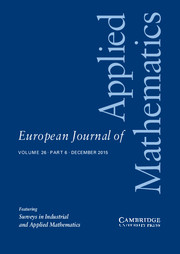Crossref Citations
This article has been cited by the following publications. This list is generated based on data provided by
Crossref.
Blömker, Dirk
Flandoli, Franco
and
Romito, Marco
2009.
Markovianity and ergodicity for a surface growth PDE.
The Annals of Probability,
Vol. 37,
Issue. 1,
Winkler, Michael
2011.
Global solutions in higher dimensions to a fourth-order parabolic equation modeling epitaxial thin-film growth.
Zeitschrift für angewandte Mathematik und Physik,
Vol. 62,
Issue. 4,
p.
575.
Blömker, Dirk
and
Romito, Marco
2012.
Local existence and uniqueness in the largest critical space for a surface growth model.
Nonlinear Differential Equations and Applications NoDEA,
Vol. 19,
Issue. 3,
p.
365.
Agélas, Léo
2015.
Global regularity of solutions of equation modeling epitaxy thin film growth in $${\mathbb{R}^d, d = 1,2}$$ R d , d = 1 , 2.
Journal of Evolution Equations,
Vol. 15,
Issue. 1,
p.
89.
Blömker, Dirk
and
Romito, Marco
2015.
Stochastic PDEs and Lack of Regularity.
Jahresbericht der Deutschen Mathematiker-Vereinigung,
Vol. 117,
Issue. 4,
p.
233.
Agélas, Léo
2019.
Finite time blow-up of complex solutions of the conserved Kuramoto–Sivashinsky equation in ℝdand in the torus 𝕋d,d⩾ 1.
Proceedings of the Royal Society of Edinburgh: Section A Mathematics,
Vol. 149,
Issue. 5,
p.
1175.
Ożański, Wojciech S.
2019.
A sufficient integral condition for local regularity of solutions to the surface growth model.
Journal of Functional Analysis,
Vol. 276,
Issue. 10,
p.
2990.
Ożański, Wojciech S.
and
Robinson, James C.
2019.
Partial Regularity for a Surface Growth Model.
SIAM Journal on Mathematical Analysis,
Vol. 51,
Issue. 1,
p.
228.
Liu, Yang
and
Li, Wenke
2021.
A class of fourth-order nonlinear parabolic equations modeling the epitaxial growth of thin films.
Discrete & Continuous Dynamical Systems - S,
Vol. 14,
Issue. 12,
p.
4367.
Yang, Jiaqi
2021.
Energy conservation for weak solutions of a surface growth model.
Journal of Differential Equations,
Vol. 283,
Issue. ,
p.
71.
Choi, Jongkeun
and
Yang, Minsuk
2021.
New regularity criterion for suitable weak solutions of the surface growth model.
Applied Mathematics Letters,
Vol. 112,
Issue. ,
p.
106720.
Burczak, Jan
Ożański, Wojciech S.
and
Seregin, Gregory
2021.
On regularity properties of a surface growth model.
Proceedings of the Royal Society of Edinburgh: Section A Mathematics,
Vol. 151,
Issue. 6,
p.
1869.
Duan, Ning
and
Yuan, Shuang
2022.
Global well-posedness and large time behavior of epitaxy thin film growth model.
Boundary Value Problems,
Vol. 2022,
Issue. 1,
Wei, Wei
Yu, Huan
and
Huang, Yike
2022.
Decay Rates of Solutions to the Surface Growth Equation and the Navier–Stokes System.
Bulletin of the Malaysian Mathematical Sciences Society,
Vol. 45,
Issue. 6,
p.
3085.
Wei, Wei
Wang, Yanqing
and
Huang, Yike
2023.
On the higher derivatives estimate of the surface growth equation.
Nonlinear Analysis,
Vol. 227,
Issue. ,
p.
113157.
Wang, Yan Qing
Huang, Yi Ke
Wu, Gang
and
Zhou, Dao Guo
2023.
Partial Regularity of Suitable Weak Solutions of the Model Arising in Amorphous Molecular Beam Epitaxy.
Acta Mathematica Sinica, English Series,
Vol. 39,
Issue. 11,
p.
2219.
Magliocca, Martina
2024.
On a fourth order equation describing single-component film models.
Nonlinear Analysis: Real World Applications,
Vol. 79,
Issue. ,
p.
104137.
Smii, Boubaker
2024.
Representation of the solution of a nonlinear molecular beam epitaxy equation.
AIMS Mathematics,
Vol. 9,
Issue. 12,
p.
36012.
Wang, Yanqing
Wei, Wei
Ye, Yulin
and
Yu, Huan
2024.
Energy dissipation of weak solutions for a surface growth model.
Journal of Differential Equations,
Vol. 407,
Issue. ,
p.
432.
Feng, Tingfu
Dong, Yan
Zhang, Kelei
and
Zhu, Yan
2025.
Global existence and blow-up to coupled fourth-order parabolic systems arising from modeling epitaxial thin film growth.
Communications in Analysis and Mechanics,
Vol. 17,
Issue. 1,
p.
263.

